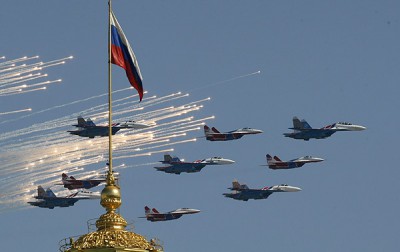EURASIA. The crisis between Russia and Ukraine caused deep concern among the authoritarian governments in Central Asia. Now they face a dilemma. The military moves of the Kremlin provoke certain nervousness among them because, as more experts argue, they may see themselves as the Kremlin’s potential target. Nevertheless, they would also like to take in some of sovereign stand that Ukraine was audacious enough to take against Russia.
The state-controlled media of Central Asian states prefer to keep quiet about the Ukrainian revolution and the overthrow of the government as well as the Crimea annexation by Russia. The reason is may be found in the relations between the ousted Viktor Yanukovych and the CA elites and the similarities of the regimes. Therefore, it is not surprising that Euromaidan revolution is practically not covered by Central Asian mass media.
As for Russian occupation and further annexation of the Crimea, the leaders of the Central Asian states did not officially comment on this issue except for the Kyrgyz president, Almazbek Atambaev who expressed solidarity with the popular uprising in Ukraine. Other leaders preferred to remain “silent” fearing to “offend” and negatively affect relation with Moscow. Kazakhstan and Uzbekistan issued official statement where they expressed concern about the further escalation of the crisis, appealing all parts to refrain from the use of force, which could lead to unpredictable consequences. However, both of these statements avoid direct reference to Russia and do not take sides. Nevertheless, the Uzbek statement did mention the concerns on the sovereignty and territorial integrity of Ukraine.
The Russian troops were moved to Crimea with the excuse of a necessity to protect the large Russian-speaking population. Like in Crimea, there are significant Russian communities in Central Asia despite large emigration after 1991. The biggest community of Russian lives in Kazakhstan, where Russians mostly live in the north of the country. In Uzbekistan, Russians predominantly live in the capital, Tashkent, and other big towns. The ethnic Russian minority supports Kazakhstan’s actual government and is totally engaged in political, social and economic spheres of life. Almost the same situation can be observed in Uzbekistan but to a less extent. In Turkmenistan, the Russian minority is exposed to a large-scale discrimination since independence in 1991, but Russian administration has never prioritized this issue in their bilateral relations with Turkmenistan. This is probably of long-term strategic and significant gas contracts that Moscow gas with Turkmenistan.
There are opinions, that at a certain time in the future there might be a situation when Central Asian states will be invaded by Russian troops with the same kind of excuse used by Moscow to justify its military “operation” in Crimea. These analysts point out the existing parallels between the Russian naval base in Crimea and the largest land military base of Russia abroad in Tajikistan with the other military base in Kyrgyzstan. In their view, any ruling regime in Central Asia, which will be less friendly in interstate relations, will also likely worry Russia, and it will seek to defend its interests.
However, I am far from making the same parallels between Crimea and Central Asia. In my regard, I disbelieve in the possibility of Russia to resort to aggression and achieve the occupation of parts of Central Asia. If Russia wants to achieve its goals in the region, it will choose geopolitical influence rather than military invasion or simply tighten labor migration control that would negatively affect budgets of these states, which heavily depend on remittance flow.
The other reason is that Central Asia, being an oil and gas abundant region, became a source provider of raw materials to big superpowers as China, USA and EU with Russia. None of these actors will let Russia be the only holder of access to all these “pleasures” and will halt any Russian expansion towards the Central Asian region. Russian is aware of this fact and would think twice before being engaged into such kind of venture. In that situation, Russia would risk a lot to start military campaign where it hardly has any chance to be the favorite. Therefore, the trigger of military movements of Russian occupation towards Central Asia can be unrealizable and opportunistic step of Kremlin’s foreign policy and seems not be on the short term policy agenda.

